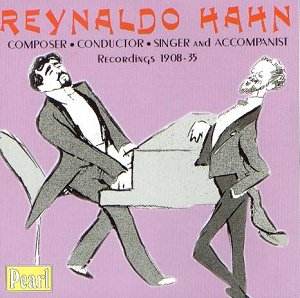This is a judiciously chosen selection from
amongst Hahn’s many prodigious gifts. The dominating feature is
his voice, self-accompanied of course in the manner of George
Henschel, and one that has occasioned more than a fair share of
critical bewilderment over the years. The register is sometimes
uncertain – baritone, low tenor? – and its actual usage has generated
a range of responses, from admiration to frigid contempt via speculative
amusement. Hahn, of course, was not a professional singer; he
did appear at suitably elegant Parisian soirées but his
recording career as a singer is quite out of proportion to any
public career in the role though clearly not out of proportion
to his contemporary musical celebrity. His first recordings date
from 1909 and Hahn returned to the studios two years later for
a further session. After the end of the First World War, during
which he served in the French Army, he was back for more recordings.
Pearl include these in addition to examples from the later sessions,
including those provisionally dated to May 1928, as well as the
1930 and 1937 recordings.
It’s most instructive to listen to Hahn’s performance
of his own La barcheta, for example, from Venezia,
the cycle in the Venetian dialect and a setting of a poem by Pietro
Buratti. Whatever the constraints on timing in 1909 this is still
a performance of a wholly different interpretative stance from
that of, say, Anthony Rolfe Johnson and Graham Johnson in their
exquisitely eroticised recording on Hyperion. They make explicit
the rocking and languorous sensuality of the setting, in lapping
waves of desire. Hahn on the other hand is utterly robust; he’s
jaunty, not sexy, with the canal-lapping rhythms choppy and animated,
the slither of a piano postlude at the end strong and decisive;
no sensual crooning for Hahn, this is a hummed song recollected
in strength not an invitation to love. Which is no more I suppose
than saying that the authorial voice, in musical terms, is predominantly
one that eschews emotive highlights. As with most composer-performers
Hahn is straightforward and decisive. The famous recording from
Così fan tutte demonstrates perfectly the problem
of Hahn’s range; he stands on some curious cusp between voice
types even though as the very next piece shows, Gounod’s Maid
of Athens, he had a non-existent top. Where Hahn really scores
is in his idiomatic understanding of parlando – listen to an exceptional
example in Bizet’s Chanson d’avril; there’s no real voice,
as such, but the conversational ease is revelatory, the style
superb.
From the same session comes one of his most famous
sides, Offenbach’s Les charbonniers et fariniers and Un
homme d’un vrai mérite (from La Boulangère
a des écus). The charm is simply ineffable –
lightness, perfect articulation of vowels, nostalgic reflection,
all held securely in place with the briskest and most scintillating
of wit. Accompanying the tenor Guy Ferrant we can hear how Hahn
passed on effortless command of the Recitativo style of song making,
of which Chien fidèle is the most notable example
and how wonderfully he reflects the antique delicacy of Charles
d’Orléans’ poetry. As a counterblast try the almost aphoristic
reticence of the piano part in Paysage triste, a wholly
superior Verlaine setting.
The disc is more than merely rounded out with
the ballet suite Le Bal de Béatrice d’Este and a
few highlights from La Marchand de Venise. The former has
a small and stylish band of instrumentalists, calling themselves
with prosaic dedication the French Gramophone Chamber Orchestra.
There are some colourful woodwind players there in the finest
French tradition – gorgeous flautist – and they play with ear
titillating panache. The final courante has luscious baroque style
trumpet panoply. La Marchand de Venise was an opera that
was twenty years in the making and received its premiere in 1935.
The extracts go some way to pointing the mellifluous ease of the
score and the cast, headed by Heldy, with her imperious impersonation
of Portia armed only, it seems, with hauteur and some inexhaustibly
rolled r’s, is a splendidly involved one.
The transfers are by Keith Hardwick. They cope
well with the 1909 discs – accepting some little blasting on climaxes
and some inevitable wear. Hearing Hahn sing is a fascinating experience
and hearing the tradition he came to embody, though himself not
French born, is one that can, without exaggeration, be traced
throughout the course of this splendid disc.
Jonathan Woolf


